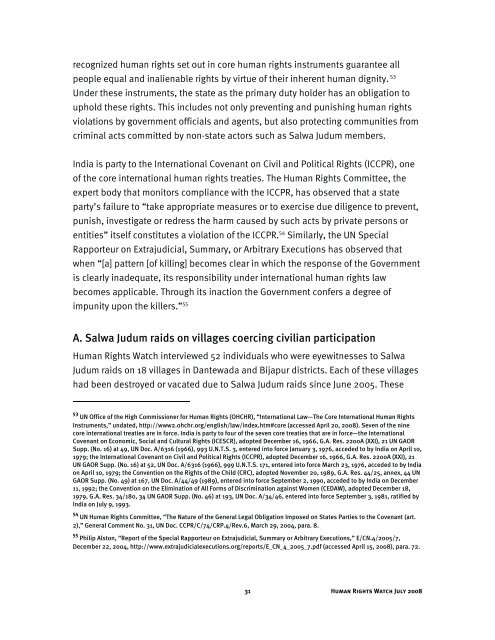âBeing Neutral is Our Biggest Crimeâ - Global Coalition to Protect ...
âBeing Neutral is Our Biggest Crimeâ - Global Coalition to Protect ...
âBeing Neutral is Our Biggest Crimeâ - Global Coalition to Protect ...
Create successful ePaper yourself
Turn your PDF publications into a flip-book with our unique Google optimized e-Paper software.
ecognized human rights set out in core human rights instruments guarantee all<br />
people equal and inalienable rights by virtue of their inherent human dignity. 53<br />
Under these instruments, the state as the primary duty holder has an obligation <strong>to</strong><br />
uphold these rights. Th<strong>is</strong> includes not only preventing and pun<strong>is</strong>hing human rights<br />
violations by government officials and agents, but also protecting communities from<br />
criminal acts committed by non-state ac<strong>to</strong>rs such as Salwa Judum members.<br />
India <strong>is</strong> party <strong>to</strong> the International Covenant on Civil and Political Rights (ICCPR), one<br />
of the core international human rights treaties. The Human Rights Committee, the<br />
expert body that moni<strong>to</strong>rs compliance with the ICCPR, has observed that a state<br />
party’s failure <strong>to</strong> “take appropriate measures or <strong>to</strong> exerc<strong>is</strong>e due diligence <strong>to</strong> prevent,<br />
pun<strong>is</strong>h, investigate or redress the harm caused by such acts by private persons or<br />
entities” itself constitutes a violation of the ICCPR. 54 Similarly, the UN Special<br />
Rapporteur on Extrajudicial, Summary, or Arbitrary Executions has observed that<br />
when “[a] pattern [of killing] becomes clear in which the response of the Government<br />
<strong>is</strong> clearly inadequate, its responsibility under international human rights law<br />
becomes applicable. Through its inaction the Government confers a degree of<br />
impunity upon the killers.” 55<br />
A. Salwa Judum raids on villages coercing civilian participation<br />
Human Rights Watch interviewed 52 individuals who were eyewitnesses <strong>to</strong> Salwa<br />
Judum raids on 18 villages in Dantewada and Bijapur d<strong>is</strong>tricts. Each of these villages<br />
had been destroyed or vacated due <strong>to</strong> Salwa Judum raids since June 2005. These<br />
53 UN Office of the High Comm<strong>is</strong>sioner for Human Rights (OHCHR), “International Law—The Core International Human Rights<br />
Instruments,” undated, http://www2.ohchr.org/engl<strong>is</strong>h/law/index.htm#core (accessed April 20, 2008). Seven of the nine<br />
core international treaties are in force. India <strong>is</strong> party <strong>to</strong> four of the seven core treaties that are in force—the International<br />
Covenant on Economic, Social and Cultural Rights (ICESCR), adopted December 16, 1966, G.A. Res. 2200A (XXI), 21 UN GAOR<br />
Supp. (No. 16) at 49, UN Doc. A/6316 (1966), 993 U.N.T.S. 3, entered in<strong>to</strong> force January 3, 1976, acceded <strong>to</strong> by India on April 10,<br />
1979; the International Covenant on Civil and Political Rights (ICCPR), adopted December 16, 1966, G.A. Res. 2200A (XXI), 21<br />
UN GAOR Supp. (No. 16) at 52, UN Doc. A/6316 (1966), 999 U.N.T.S. 171, entered in<strong>to</strong> force March 23, 1976, acceded <strong>to</strong> by India<br />
on April 10, 1979; the Convention on the Rights of the Child (CRC), adopted November 20, 1989, G.A. Res. 44/25, annex, 44 UN<br />
GAOR Supp. (No. 49) at 167, UN Doc. A/44/49 (1989), entered in<strong>to</strong> force September 2, 1990, acceded <strong>to</strong> by India on December<br />
11, 1992; the Convention on the Elimination of All Forms of D<strong>is</strong>crimination against Women (CEDAW), adopted December 18,<br />
1979, G.A. Res. 34/180, 34 UN GAOR Supp. (No. 46) at 193, UN Doc. A/34/46, entered in<strong>to</strong> force September 3, 1981, ratified by<br />
India on July 9, 1993.<br />
54 UN Human Rights Committee, “The Nature of the General Legal Obligation Imposed on States Parties <strong>to</strong> the Covenant (art.<br />
2),” General Comment No. 31, UN Doc. CCPR/C/74/CRP.4/Rev.6, March 29, 2004, para. 8.<br />
55 Philip Als<strong>to</strong>n, “Report of the Special Rapporteur on Extrajudicial, Summary or Arbitrary Executions,” E/CN.4/2005/7,<br />
December 22, 2004, http://www.extrajudicialexecutions.org/reports/E_CN_4_2005_7.pdf (accessed April 15, 2008), para. 72.<br />
31<br />
Human Rights Watch July 2008
















